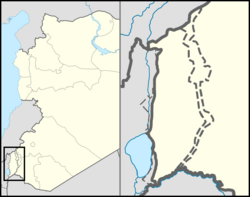Za'ura, Syria
Appearance
Za'ura
زعورة | |
|---|---|
Village | |
| Coordinates: 33°13′08″N 35°42′36″E / 33.218845°N 35.709916°E | |
| Country | |
| Governorate | Quneitra |
| District | Quneitra |
| Region | Golan Heights |
| Destroyed | 1967[1] |
Za'ura (Arabic: زعورة), was a Syrian Alawite village situated in the northwestern Golan Heights.[2][3]
The German explorer Ulrich Jasper Seetzen visited Za'ura in 1806 during his travels in the region.[4]
In 1888 the village consisted of 65 dwellings and 350 residents.[5] They grew rice in the Hula marshes and tobacco around the village.[5]
Before 1967, it was one of three mainly Alawite villages in the Golan Heights together with 'Ayn Fit and Ghajar.[3] After Israel occupied the area in the Six-Day War, they began destroying Syrian villages in the Golan Heights.[6] Za'ura was destroyed in 1967.[7]
See also
[edit]References
[edit]- ^ Sulimani & Kletter 2022, p. 50
- ^ "Golan Heights and vicinity : October 1994". The Library of Congress. 1994-01-01. Retrieved 2024-08-14. (Za'ura shown as an abandoned/dismantled Syrian village)
- ^ a b Abu Fakhr, Sakr (2000). "Voices from the Golan". Journal of Palestine Studies. 29 (4): 5–36. doi:10.2307/2676559. JSTOR 2676559.
- ^ Winter, Stefan (2016). A History of the 'Alawis: From Medieval Aleppo to the Turkish Republic. Princeton University Press. p. 31. ISBN 978-0-691-17389-4. Retrieved 2024-08-14.
- ^ a b Schumacher, Gottlieb (1888). The Jaulân: Surveyed for the German Society for the Exploration of the Holy Land. London: Richard Bentley and Son. p. 272.
- ^ Sulimani & Kletter 2022, pp. 55–56
- ^ Sulimani & Kletter 2022, p. 50
Bibliography
[edit]- Sulimani, Gideon; Kletter, Raz (2022). "Settler-Colonialism and the Diary of an Israeli Settler in the Golan Heights: The Notebooks of Izhaki Gal". Journal of Holy Land and Palestine Studies. 21 (1). Edinburgh University Press: 48–71. doi:10.3366/hlps.2022.0283. ISSN 2054-1988.

